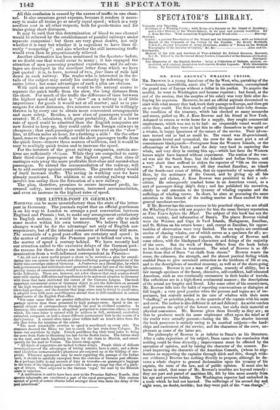THE LETTER-POST IN GERMANY.
NoTnrivo can be more unsatisfactory than the state of the letter- post in Germany. The journals report that an official gentleman is on his way to London to arrange a post convention between England and Prussia ; but, to make any arrangement satisfactory
i
to English notions, t would be necessary for our ally to alter some modes within his own territory. We believe that such changes would be for the advantage not only of English cor- respondents, but of the internal commerce of Germany still more. The essentials of a good post-office are certainty and speed : in the matter of certainty the Prussian post is behind our own' in the matter of speed a century behind. We have recently had our attention caned to the excessive delays of the German post : the reasons for those delays are indicated in the subjoined com- munication from a well-informed correspondent in Prussia— "An old and a most useful project is about to be revived—a plan for consoli- dating into one system the various and often conflicting postage-mulations of the thirty-nine sovereign states of Germany. A Postverein on a Berg plan, by which beth governments and individuals were permitted to make full use ot the daily im- proving means of communication, would be a creditable and fitting accompaniment to the Zollverein. There are, however, not a few chances that such a nmon would meet with similar difficulties and impediments to its universal adoption in Germany with those that have restricted the extent of the Customs League. The most important commercial states of Germany object to join the Zollverein on acoount of the high import-duties imposed by its tariff. The same states are equally hos- tile to high postage; and the doctrine that large sums may be levied in small rates, is. adopted even with more unwillingness abroad than is still manifested in certain departments of the English Post-Office. 'For some cases there are greater difficulties to be overcome in the German postage system than those presented by high postage-rates. Speed is the es- sential element of correspondence through the post in civilized countries. In Germany, this consideration is altogether postponed to numerous others; to most which, the same letter is entered with its address in fall, reentered, controlled, extracted, compared, on half-a-dozen different postmasters' lists in the course of a day's journey. A control often takes place within half an hour's drive from the city that forms the terminus of the course.
" The most remarkable aversion to speed is manifested on every side. The
steamers descend the Rhine too late to catch the last train from Cologne. No trains run anywhere by night. French postillions flog their tired jades to bring the news from Paris to Strasburg too late for the Baden trains. The letters sleep pa the road, and reach Augsburg too late for the train to Munich, and conse-
quently for the mail to Vienna. The letters sleep again.
"All kinds of conjectures are tacked to these delays. People think of delicate investigations—of the advantages of letting couriers have a start; and a thou- sand (doubtless unwarrantable) phantoms are conjured up at the bidding of sus- picion. Whatever agreement may be made regarding the passage of the Indian mail, it should be carefully exempted from the clutches of German post officials. An a package liable to any amount of duty in transitu—as passenger's baggage in the train of the highest-paid courier—let it take any shape but that of a 'Nick- age of letters. Once subjected to the German 'regal,' the mail by the Rhenish route is valueless.
"A notification is said to have been sent to the Prussian Railway Boards, that electric telegraphs are considered a fart of the royal prerogative. This curious *etch of power of course obtains belief amongst those who deem the delay of the post intentional."


























 Previous page
Previous page